Saving money on utility bills is something we’d all like to master. The good news is that there are effective strategies to achieve this without sacrificing comfort or convenience. Let’s dive into some practical tips to trim those bills down!
The first step to reducing your utility bills is understanding your current usage. Many utility companies provide access to detailed usage data, either online or on paper. Analyzing this data can help you identify areas where you’re using more energy than necessary. Look for patterns, such as higher electricity usage during certain times of the day or spikes in water usage. This awareness will empower you to make targeted changes. Some providers even offer apps that provide real-time data and alerts, helping you stay informed and take immediate action when usage seems abnormal.
Once you’ve familiarized yourself with your usage patterns, it’s time to implement some simple adjustments to your daily routines. Minor habit changes can have a significant impact on your bills. Remembering to turn off lights and appliances when not in use, for instance, can reduce electricity costs. Similarly, small changes in your thermostat settings can lead to substantial savings over time, especially if you live in an area with extreme summer or winter temperatures. Consider adjusting the temperature by just a few degrees and see the difference it makes; you might even discover you prefer a slightly cooler or warmer environment!
Investing in energy-efficient appliances is another effective way to lower your utility expenses. While the initial cost may be higher, these appliances often use significantly less energy over their lifetime, resulting in long-term savings. Look for the ENERGY STAR label when purchasing new appliances. This label indicates that the product meets strict energy efficiency criteria set by the US Environmental Protection Agency, assuring you of its ability to help lower your bills and reduce your carbon footprint.
In addition to appliances, pay attention to the little things that can make a big difference. LED light bulbs last longer and use less energy than traditional incandescent bulbs, so make the switch and start saving. Also, be mindful of ‘energy vampires’—these are electronic devices that continue to draw power even when they’re turned off or in standby mode. Unplug these devices, or use power strips that can be switched off, to prevent unnecessary energy usage.
Water bills can also benefit from a few simple strategies. Low-flow showerheads and faucet aerators reduce water usage without compromising on pressure or performance. Fixing leaky faucets promptly and ensuring your toilets are running efficiently will also help keep water bills in check.
Solar power is an increasingly popular way to reduce your reliance on the grid and lower utility costs. Installing solar panels can be a substantial investment, but it may pay off in the long run. Many companies offer leasing or financing options, making solar energy more accessible. If you’re unable to install solar panels, look into community solar programs, which allow multiple people to benefit from a shared solar power source.
Finally, take advantage of assistance programs offered by utility companies and government agencies. These programs can provide discounts, payment plans, and even free home energy audits to help you identify further savings opportunities. Staying informed about available programs ensures you can access the support you need to manage your utility costs effectively.
